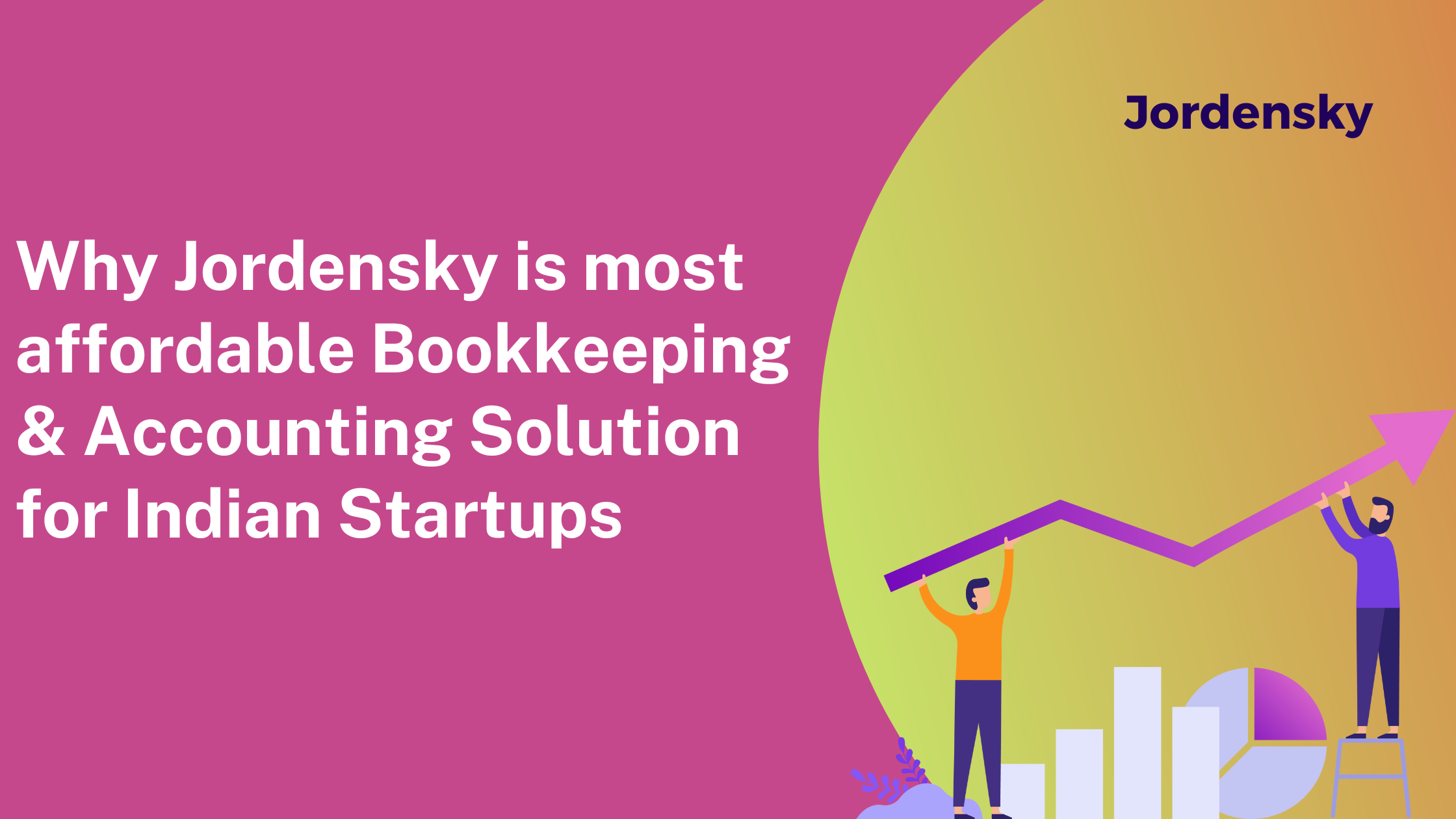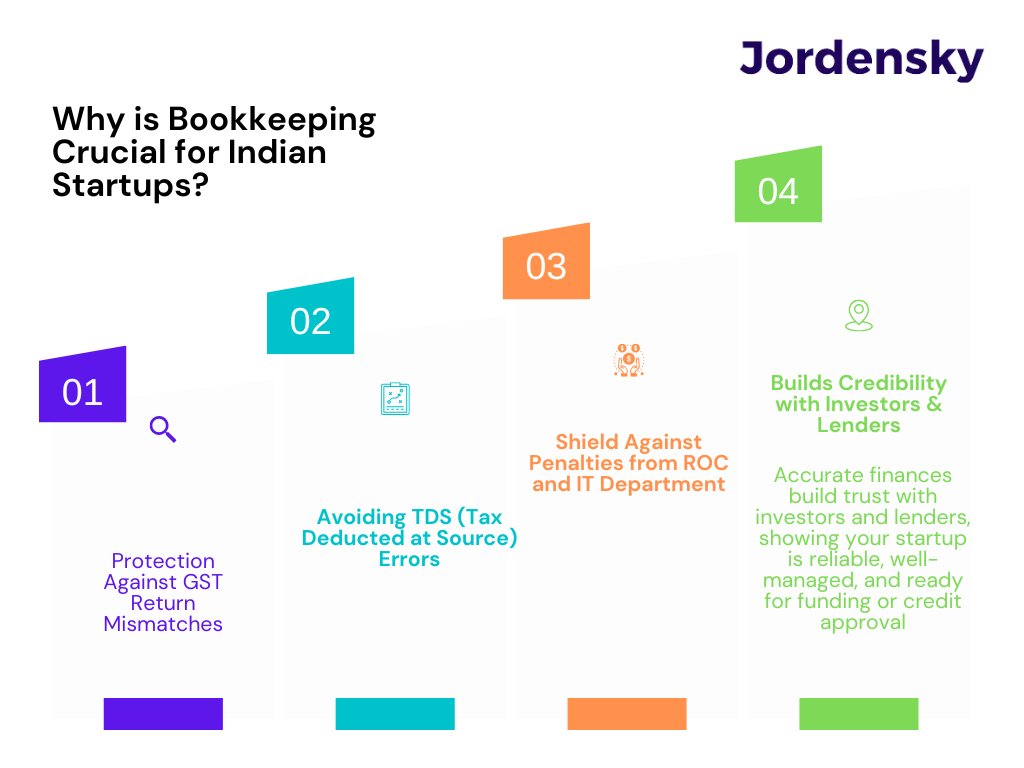Affordable bookkeeping for Indian startups. Expert accounting from just ₹8,000/month

Running a startup in India is no small feat. Between managing clients, building your product, and attracting investors, financial management often takes a back seat. But here’s the truth: strong Accounting is the foundation of long-term business health.
Without it, you risk GST penalties, misinformed decisions, and investor red flags. The good news? You don’t need a full-time accountant. Today, powerful tools like Zoho Books, Wave, and FreshBooks offer flexible, affordable, and expert-backed bookkeeping & Accounting services for startups—starting as low as ₹8,000/month.
Bookkeeping is the systematic recording, organizing, and managing of a business’s financial transactions. It includes everything from tracking daily expenses and income to maintaining records of invoices, GST filings, bank reconciliations, payroll, and vendor payments. For startups in India, bookkeeping isn’t just about staying organized—it’s a foundational pillar of long-term financial health and compliance.
Accounting builds on the foundation laid by bookkeeping. It involves summarizing, analyzing, and interpreting financial data to make informed decisions.
While bookkeeping answers “What happened with the money?”, accounting answers “What does that mean for the business?”
Key tasks in accounting include:
For startups, accounting is what turns numbers into actionable insights. It helps you understand if your burn rate is sustainable, whether you’re profitable, or if it's time to raise another round of funding

India’s regulatory ecosystem can be complex for new businesses. Between the GST regime, TDS compliance, MCA (Ministry of Corporate Affairs) filings, and Income Tax obligations, startups have a lot to manage—often with limited resources.
Here’s why bookkeeping should be a top priority from day one:
Under India’s GST system, businesses are required to file monthly or quarterly returns such as GSTR-1 and GSTR-3B. Any mismatch between your sales invoices and what your vendors report can lead to input tax credit denial or show-cause notices from the GST department.
How bookkeeping helps:
Accurate and timely recording of invoices ensures your GST filings reflect the actual business transactions. This minimizes mismatches and helps claim rightful input credits.
Startups making payments for rent, professional services, or contractor fees must deduct and deposit TDS on time. Errors—like wrong PAN entry, delayed deposit, or incorrect challan code—can lead to interest, late fees, or even disallowance of expense claims during tax assessments.
How bookkeeping helps:
A good bookkeeping system tracks due TDS on every applicable transaction and sets reminders for timely payments and filing of returns (like 26Q or 24Q).
Registered startups (especially private limited companies or LLPs) must file annual returns with the Registrar of Companies (ROC) and maintain statutory books under the Companies Act. Missing deadlines or errors in filings can invite steep penalties and legal complications.
How bookkeeping helps:
With clean and well-maintained books, startups can generate accurate financial statements (like Balance Sheets and Profit & Loss statements), easing their ROC and income tax compliance.
If you're planning to raise funds from angel investors or VCs, or even secure a business loan, your financial records speak volumes. Investors want visibility into your burn rate, runway, revenue sources, and cost structure.
How bookkeeping helps:
Proper books provide transparent financial insights and instill confidence among potential backers. In fact, many funding rounds stall or get rejected due to messy financials.
Beyond compliance and investor readiness, good bookkeeping empowers founders with data-driven insights. It tells you:
Without this visibility, you're essentially flying blind.
Let’s break down the most startup-friendly options:
Use Case: Mumbai-based D2C brand Khadi Naturals uses Zoho Books to manage 1000+ SKUs and automate GST filings.
Use Case: Freelance graphic designer Amit from Jaipur uses Wave to track income from Upwork and Fiverr clients.
Use Case: A Pune-based SaaS startup serving U.S. clients uses FreshBooks for clean, client-facing invoicing.
Instead, opt for Zoho Books or a combo of Wave + CA if you're budget-constrained.
Hiring a full-time accountant can easily cost ₹30,000–₹50,000/month, not including tools like Tally or Zoho, or added compliance services. Startups often struggle with this upfront cost—especially in early stages.
That’s why many startups are turning to outsourced bookkeeping services, where expert teams handle compliance, reporting, and strategy—often for half the cost of a salaried accountant.
Let’s break down what you actually get in a bookkeeping package priced between ₹8,000–₹40,000/month.
Whether you're opting for a basic plan or a premium service, here’s what most expert bookkeeping packages offer:
Your provider will set up and manage tools like Zoho Books, FreshBooks, or Tally Prime— your business type.
Every income, expense, vendor bill, and bank entry is recorded and categorized accurately. Clean data means better decisions.
No more late fees. Your service partner handles monthly GST returns (GSTR-1 & 3B), quarterly TDS, and annual ITR filings.
Mismatch between books and your bank account? Regular bank reconciliation ensures your cash position is always clear.
Receive Profit & Loss, Balance Sheet, and Cash Flow reports each month—often with easy dashboards or summaries.
Some plans (₹25,000–₹40,000/month) include a Virtual CFO who gives strategic advice on budgeting, cash flow, and funding prep.
Jordensky is one of India’s fast-growing bookkeeping service providers, helping startups, D2C brands, and MSMEs manage their financial compliance with confidence.
They offer:
Q1: Which bookkeeping software is best for Indian startups?
Ans: Zoho Books is ideal due to its built-in GST, TDS, and Indian invoicing support.
Q2: Is Wave free for Indian businesses?
Ans: Yes, Wave is free, but it lacks Indian tax compliance features.
Q3: Can I use FreshBooks for international clients from India?
Ans: Yes, FreshBooks supports PayPal/Stripe, ideal for SaaS and service exports.
Q4: What does expert bookkeeping cost in India?
Ans: With Jordensky, expert bookkeeping plans start at just ₹8,000/month. depending on the level of services required. Basic plans include transaction recording, GST filings, and monthly reports, while premium plans offer Virtual CFO support, advanced analytics, and investor-ready reporting.
Your startup deserves the best tools and the best financial foundation. Whether you’re just starting out or scaling rapidly, smart bookkeeping ensures you’re compliant, investor-ready, and in control.
Ready to simplify your startup’s finances?
Outsourcing your accounting isn't just cost-effective—it’s strategic. Affordable bookkeeping empowers startups with:
At Jordensky, we help Indian startups—from Mumbai to Pune to Bangalore—streamline their finances with personalized, tech-enabled bookkeeping solutions. Whether you're a SaaS founder, D2C brand, or solo entrepreneur, our services are tailored to fit your unique needs.
Think of bookkeeping as the financial GPS of your startup journey. It keeps you on track, alerts you to potential pitfalls, and guides you toward your goals with confidence. Whether you're bootstrapped or backed by VCs, bookkeeping isn't optional—it's essential for sustainable growth.
The good news? Indian startups no longer need to rely on messy spreadsheets or scramble at the last minute to meet compliance deadlines. With digital tools and expert-led services becoming more accessible, staying financially organized is easier than ever.
Jordensky is one such trusted partner for modern startups—offering CA-backed bookkeeping, GST filing, TDS compliance, and financial reporting, all under one roof. Whether you're based in Mumbai, Delhi, Pune, or Bengaluru, Jordensky’s cloud-first approach ensures real-time visibility and error-free books—so you can focus on growing your business, not decoding tax laws.
Start smart. Scale faster. Bookkeeping done right—with Jordensky